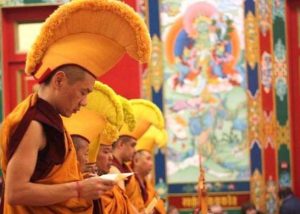
As a part of Extinction Rebellion (XR) Buddhists, I recently spent a week in London to join the protests against the financial sector and the government. In addition to XR’s existing three demands—that the government tell the truth, commit to net zero carbon emissions by 2025, and use citizen assemblies to decide how that will be done—XR has a new, more immediate demand that the government enforce an immediate end to investment in fossil fuels.
For a fortnight, XR caused disruption in London. We planted a giant pink table on a busy roundabout near Leicester Square, erected bamboo structures with people at the top, parked trucks with locked on protestors, and held mass marches along major streets. More than 500 people were arrested for remaining in areas they had been asked to leave, and many thousands of police officers were drafted in from around the country to contain the protestors and protect “business as usual.”

Non-violent civil disobedience is intentionally disruptive. This is a facet of XR’s action plan that I initially found difficult to stomach. It is also one of the most common objections to our protests—we get in the way of ordinary Londoners, we hurt the pockets of taxi drivers, we cost the police force a fortune. These things are all true. If I imagine what it is like to see hundreds of people dancing in the middle of the street when I’m simply trying to go to work, I can understand that it would feel frustrating.
As a Buddhist, I’ve always been a proponent of peaceful conflict resolution. I am inspired by the example of the Buddha, who never needed to raise his voice to get his point across, and who always met violence with equanimity. I love the story of when he meets Angulimala, the infamous murderer who wore a necklace made from the finger bones of his victims. The Buddha is nonplussed, and as Angulimala runs toward him to hurt him, the Buddha just carries on walking calmly and slowly, and however fast Angulimala runs, he’s unable to catch up with the Buddha!

It is one thing to remain calm in the face of violence, but it’s quite another to be deliberately obstructive. Since returning from the rebellion I’ve been feeling the usual doubts about the necessity of disrupting the lives of others, especially as the right-wing media have been doing their usual work to vilify XR. I have been finding reassurance in the writings of Martin Luther King Jr., who left such a precious legacy to the world. King spoke with great clarity and passion about the necessity of remaining nonviolent in the face of violence. He was also arrested 29 times. In 1961, King was arrested for a sit-in in a segregated restaurant, and the next year for obstructing a sidewalk. In 1962, he was arrested for holding a prayer vigil in Albany. These arrests were not the result of an insipid quietism, they were a result of King being obstructive—of doing things the law said he shouldn’t be doing. He and many other brave people were bringing attention to the terrible injustices against people of color, the product of a long and bloody history of racism and colonialism. King stepped forward, despite meeting huge resistance, and he kept speaking up.
I am wary of making direct comparisons between the civil rights movement and today’s nonviolent resistance by XR and other environmental groups. Many members of XR hold a lot of privilege. As a white, middle-class person protesting in the UK, I have been treated well by the police whenever they have arrested me. I have grown up taking this privilege for granted, and I know nothing of how it is to be born into an oppressed group that has been silenced, “othered,” and violently exploited for centuries.
Nevertheless, I am personally hugely inspired and encouraged by King’s example. He was deeply unpopular in his lifetime. At the time of his assassination, he had a public disapproval rating of nearly 75 per cent—worse than that of former US president Donald Trump at the time he left office. His opposition to the Vietnam War made him unpopular; drawing attention to those living in poverty made him unpopular; but he did these things anyway, supported by his faith and his belief in what was right. I think that the Buddha would approve of that kind of steadfastness in the face of opposition. I can just picture the Buddha’s face as he out-walked Angulimala—he wasn’t afraid; he just kept putting one foot in front of the other.

When I returned home, I read an article about the rebellion by award-winning journalist Henry Mance in the Financial Times, in which he described XR as annoying. He didn’t just leave it there, though, as many commentators do, but observed: “XR will always be annoying. So is the repeated beeping of my smoke alarm when its battery is flat. That’s the point. It means I change the battery, and hopefully makes sure my home doesn’t burn down. On balance, I’m glad it’s there.” (Financial Times)

I am determined to continue to be annoying. I am also lucky enough to be supported by my faith and by my many admirable colleagues—colleagues who are much braver than I. As Clare Farrell, one of the co-founders of XR, said recently: we’re not here to be popular, we’re here to be effective. I hope that we will contribute to raising the alarm—letting the governments of the world know that their people demand more of them. However successful we are in meeting that aim, at least we have tried.
See more
Extinction Rebellion may be annoying but it has a vital function (Financial Times)
Related features from Buddhistdoor Global
One Foot on the Cushion and One in the Streets — Meditators for Climate Action
How to Be a Buddhist Protester
Building a Climate Crisis Toolkit with Buddhist Wisdom
Buddhistdoor View: Honoring the Lessons of Martin Luther King Jr. for Today’s World
Standing Together: Rev. Angel Kyodo Williams’ Radical Dharma – Book Review
Buddhistdoor View: Engaged Buddhism, Donald Trump, and the Way of Compassion
Related news reports from Buddhistdoor Global
Buddhists in New York Join Greta Thunberg to Call for Action on Climate Change
Dalai Lama, Greta Thunberg, and Scientists to Discuss Crisis of Climate Feedback Loops
Monks and Activists Hold Buddhist Ceremony to Address Deforestation in Cambodia
Multi-faith Leaders Push Australian Government to Act on Climate Change











